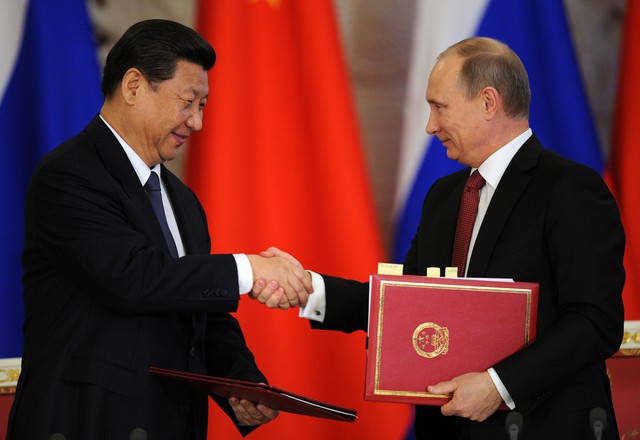(NationalSecurity.news) In a bid to challenge U.S. hegemony around the globe, Russia and China have, in recent years, developed much closer ties. However, following Moscow’s intervention in Syria, there has been growing speculation that Chinese forces could soon enter the conflict on the side of Russia, which is backing President Bashar al-Assad against a U.S.-led coalition of rebels and Western forces.
In sum, as reported by The National Interest, Moscow and Beijing are definitely forging closer ties, and that will present a growing problem for Washington and its NATO allies moving forward.
Just a few months ago, Chinese warships were deployed to the Black Sea to take part in naval exercises with the Russian fleet. In addition, China’s naval profile has been rising steadily in the Middle East, with Beijing sending its first squadron of ships into the Persian Gulf in the fall of 2014. The People’s Liberation Army Navy, or PLAN, is also engaged in anti-piracy patrolling off the coast of Aden and performed admirably during evacuation operations from Yemen last year.
Also, in 2012, forces from Russia, China and Iran held joint exercises in Syria involving 90,000 troops, 1,000 tanks and 400 aircraft.
“Major foreign and defense policy dilemmas await Beijing as it continues to plot out the future of its ‘one road, one belt‘ – China’s own strategic ‘pivot’ to the West,” The National Interest reported.
For years Western military analysts opined that military ties and foreign policy objectives between Beijing and Moscow would not sufficiently align so as to allow the formation of a major Eurasian bloc to counter NATO and the U.S. The slow pace of development of mutual infrastructure projects as well as economic ties in recent times seemed to substantiate what analysts projected.
But, as reported by The Diplomat, a major strengthening of Russia–China ties could eventually lead to the creation of a Eurasian “colossus,” though with two capitals, which would confront the United States and its allies in Europe and Asia at a time when Washington’s presence around the world is diminishing (along with its military).
Also, the time may now be right for an alliance between Russia and China. Under the Obama administration, the U.S. military has begun a slow, but steady, withdrawal from historical zones of influence. And while there have been some efforts by the Obama Administration to shift strategic focus to Asia and the Arctic, Russia appears to be exploiting a power vacuum left by Washington in the volatile Middle East.
“Signs of a steadily enhancing Russia-China partnership are quite readily visible,” The National Interest reported. “Reciprocal visits by the two Presidents to observe one another’s victory celebrations (and the conspicuous lack of Western leaders at either event) seemed to demonstrate a shared contemporary isolation as well as the common history of suffering catastrophic losses in the enormous conflagration of the Second World War.”
See also:


